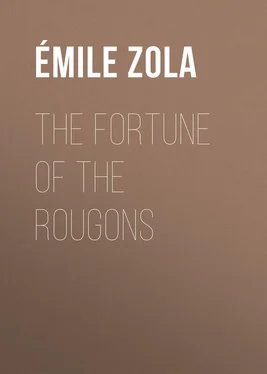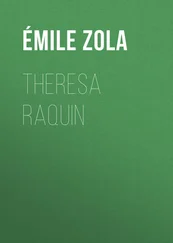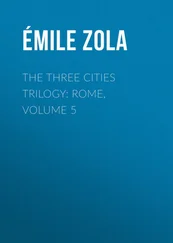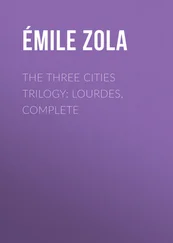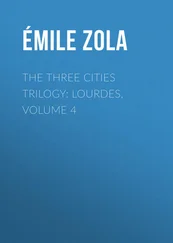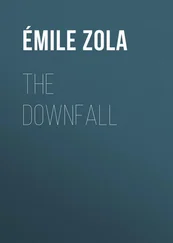Émile Zola - The Fortune of the Rougons
Здесь есть возможность читать онлайн «Émile Zola - The Fortune of the Rougons» — ознакомительный отрывок электронной книги совершенно бесплатно, а после прочтения отрывка купить полную версию. В некоторых случаях можно слушать аудио, скачать через торрент в формате fb2 и присутствует краткое содержание. Жанр: literature_19, foreign_antique, foreign_prose, на английском языке. Описание произведения, (предисловие) а так же отзывы посетителей доступны на портале библиотеки ЛибКат.
- Название:The Fortune of the Rougons
- Автор:
- Жанр:
- Год:неизвестен
- ISBN:нет данных
- Рейтинг книги:3 / 5. Голосов: 1
-
Избранное:Добавить в избранное
- Отзывы:
-
Ваша оценка:
- 60
- 1
- 2
- 3
- 4
- 5
The Fortune of the Rougons: краткое содержание, описание и аннотация
Предлагаем к чтению аннотацию, описание, краткое содержание или предисловие (зависит от того, что написал сам автор книги «The Fortune of the Rougons»). Если вы не нашли необходимую информацию о книге — напишите в комментариях, мы постараемся отыскать её.
The Fortune of the Rougons — читать онлайн ознакомительный отрывок
Ниже представлен текст книги, разбитый по страницам. Система сохранения места последней прочитанной страницы, позволяет с удобством читать онлайн бесплатно книгу «The Fortune of the Rougons», без необходимости каждый раз заново искать на чём Вы остановились. Поставьте закладку, и сможете в любой момент перейти на страницу, на которой закончили чтение.
Интервал:
Закладка:
“All the same,” the young girl continued, “I should like to be a man and handle a gun. I feel that it would do me good.”
Then, as Silvere remained silent, she perceived that she had displeased him. Her feverishness subsided, and she whispered in a supplicating tone: “You are not angry with me, are you? It’s your departure which grieves me and awakens such ideas. I know very well you are right – that I ought to be humble.”
Then she began to cry, and Silvere, moved by her tears, grasped her hands and kissed them.
“See, now, how you pass from anger to tears, like a child,” he said lovingly. “You must be reasonable. I’m not scolding you. I only want to see you happier, and that depends largely upon yourself.”
The remembrance of the drama which Miette had so sadly evoked cast a temporary gloom over the lovers. They continued their walk with bowed heads and troubled thoughts.
“Do you think I’m much happier than you?” Silvere at last inquired, resuming the conversation in spite of himself. “If my grandmother had not taken care of me and educated me, what would have become of me? With the exception of my Uncle Antoine, who is an artisan like myself, and who taught me to love the Republic, all my other relations seem to fear that I might besmirch them by coming near them.”
He was now speaking with animation, and suddenly stopped, detaining Miette in the middle of the road.
“God is my witness,” he continued, “that I do not envy or hate anybody. But if we triumph, I shall have to tell the truth to those fine gentlemen. Uncle Antoine knows all about this matter. You’ll see when we return. We shall all live free and happy.”
Then Miette gently led him on, and they resumed their walk.
“You dearly love your Republic?” the girl asked, essaying a joke. “Do you love me as much?”
Her smile was not altogether free from a tinge of bitterness. She was thinking, perhaps, how easily Silvere abandoned her to go and scour the country-side. But the lad gravely replied: “You are my wife, to whom I have given my whole heart. I love the Republic because I love you. When we are married we shall want plenty of happiness, and it is to procure a share of that happiness that I’m going way to-morrow morning. You surely don’t want to persuade me to remain at home?”
“Oh, no!” cried the girl eagerly. “A man should be brave! Courage is beautiful! You must forgive my jealousy. I should like to be as strong-minded as you are. You would love me all the more, wouldn’t you?”
After a moment’s silence she added, with charming vivacity and ingenuousness: “Ah, how willingly I shall kiss you when you come back!”
This outburst of a loving and courageous heart deeply affected Silvere. He clasped Miette in his arms and printed several kisses on her cheek. As she laughingly struggled to escape him, her eyes filled with tears of emotion.
All around the lovers the country still slumbered amid the deep stillness of the cold. They were now half-way down the hill. On the top of a rather lofty hillock to the left stood the ruins of a windmill, blanched by the moon; the tower, which had fallen in on one side, alone remained. This was the limit which the young people had assigned to their walk. They had come straight from the Faubourg without casting a single glance at the fields between which they passed. When Silvere had kissed Miette’s cheek, he raised his head and observed the mill.
“What a long walk we’ve had!” he exclaimed. “See – here is the mill. It must be nearly half-past nine. We must go home.”
But Miette pouted. “Let us walk a little further,” she implored; “only a few steps, just as far as the little cross-road, no farther, really.”
Silvere smiled as he again took her round the waist. Then they continued to descend the hill, no longer fearing inquisitive glances, for they had not met a living soul since passing the last houses. They nevertheless remained enveloped in the long pelisse, which seemed, as it were, a natural nest for their love. It had shrouded them on so many happy evenings! Had they simply walked side by side, they would have felt small and isolated in that vast stretch of country, whereas, blended together as they were, they became bolder and seemed less puny. Between the folds of the pelisse they gazed upon the fields stretching on both sides of the road, without experiencing that crushing feeling with which far-stretching callous vistas oppress the human affections. It seemed to them as though they had brought their house with them; they felt a pleasure in viewing the country-side as from a window, delighting in the calm solitude, the sheets of slumbering light, the glimpses of nature vaguely distinguishable beneath the shroud of night and winter, the whole of that valley indeed, which while charming them could not thrust itself between their close-pressed hearts.
All continuity of conversation had ceased; they spoke no more of others, nor even of themselves. They were absorbed by the present, pressing each other’s hands, uttering exclamations at the sight of some particular spot, exchanging words at rare intervals, and then understanding each other but little, for drowsiness came from the warmth of their embrace. Silvere forgot his Republican enthusiasm; Miette no longer reflected that her lover would be leaving her in an hour, for a long time, perhaps for ever. The transports of their affection lulled them into a feeling of security, as on other days, when no prospect of parting had marred the tranquility of their meetings.
They still walked on, and soon reached the little crossroad mentioned by Miette – a bit of a lane which led through the fields to a village on the banks of the Viorne. But they passed on, pretending not to notice this path, where they had agreed to stop. And it was only some minutes afterwards that Silvere whispered, “It must be very late; you will get tired.”
“No; I assure you I’m not at all tired,” the girl replied. “I could walk several leagues like this easily.” Then, in a coaxing tone, she added: “Let us go down as far as the meadows of Sainte-Claire. There we will really stop and turn back.”
Silvere, whom the girl’s rhythmic gait lulled to semi-somnolence, made no objection, and their rapture began afresh. They now went on more slowly, fearing the moment when they would have to retrace their steps. So long as they walked onward, they felt as though they were advancing to the eternity of their mutual embrace; the return would mean separation and bitter leave-taking.
The declivity of the road was gradually becoming more gentle. In the valley below there are meadows extending as far as the Viorne, which runs at the other end, beneath a range of low hills. These meadows, separated from the high-road by thickset hedges, are the meadows of Sainte-Claire.
“Bah!” exclaimed Silvere this time, as he caught sight of the first patches of grass: “we may as well go as far as the bridge.”
At this Miette burst out laughing, clasped the young man round the neck, and kissed him noisily.
At the spot where the hedges begin, there were in those days two elms forming the end of the long avenue, two colossal trees larger than any of the others. The treeless fields stretch out from the high road, like a broad band of green wool, as far as the willows and birches by the river. The distance from the last elms to the bridge is scarcely three hundred yards. The lovers took a good quarter of an hour to cover that space. At last, however slow their gait, they reached the bridge, and there they stopped.
The road to Nice ran up in front of them, along the opposite slope of the valley. But they could only see a small portion of it, as it takes a sudden turn about half a mile from the bridge, and is lost to view among the wooded hills. On looking round they caught sight of the other end of the road, that which they had just traversed, and which leads in a direct line from Plassans to the Viorne. In the beautiful winter moonlight it looked like a long silver ribbon, with dark edgings traced by the rows of elms. On the right and left the ploughed hill-land showed like vast, grey, vague seas intersected by this ribbon, this roadway white with frost, and brilliant as with metallic lustre. Up above, on a level with the horizon, lights shone from a few windows in the Faubourg, resembling glowing sparks. By degrees Miette and Silvere had walked fully a league. They gazed at the intervening road, full of silent admiration for the vast amphitheatre which rose to the verge of the heavens, and over which flowed bluish streams of light, as over the superposed rocks of a gigantic waterfall. The strange and colossal picture spread out amid deathlike stillness and silence. Nothing could have been of more sovereign grandeur.
Читать дальшеИнтервал:
Закладка:
Похожие книги на «The Fortune of the Rougons»
Представляем Вашему вниманию похожие книги на «The Fortune of the Rougons» списком для выбора. Мы отобрали схожую по названию и смыслу литературу в надежде предоставить читателям больше вариантов отыскать новые, интересные, ещё непрочитанные произведения.
Обсуждение, отзывы о книге «The Fortune of the Rougons» и просто собственные мнения читателей. Оставьте ваши комментарии, напишите, что Вы думаете о произведении, его смысле или главных героях. Укажите что конкретно понравилось, а что нет, и почему Вы так считаете.
